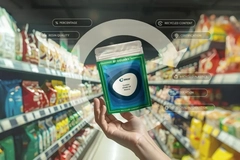KHS launches AI-based inspection tech to tackle tethered cap challenges

KHS has equipped its Innocheck TSI closure inspection unit with an AI-based fault detection system to better identify defect tethered caps during production.
The system analyzes bottle caps using patent-pending algorithms. Cameras photograph the caps in high resolution, and an AI model evaluates the data for defects.
According to KHS, the AI system can offer greater accuracy and efficiency during inspection compared to conventional systems.
Nikita Wall, labeling and inspection technology product support at KHS, says: “Our customers have high demands for quality assurance. Our AI-based fault detector has proved that it meets these requirements in intensive field tests.”
Tethered cap challenges
KHS highlights that introducing tethered caps in the EU in 2024 has required companies to update cap inspection machinery to meet product quality and protection demands.

Wall adds: “Tethered caps were rarely used before the EU directive came into force. Conventional systems frequently reach the limits of their capacity where cap inspection is concerned.”
Meanwhile, Sarah de la Mare, product line director of Closures at Berry Global, spoke to Packaging Insights about the EU legislation, calling it the “biggest packaging transformation in recent history.”
 Tethered caps require companies to adapt inspection technology.KHS indicates that introducing tethered caps had “far-reaching consequences” for bottle production in the EU.
Tethered caps require companies to adapt inspection technology.KHS indicates that introducing tethered caps had “far-reaching consequences” for bottle production in the EU.
In addition to the tethered caps, bottle cap size and design challenge conventional inspection units, which KHS hopes its latest AI feature will address.
AI expansion
KHS’ new AI system can be implemented on new and existing inspection machines, and KHS aims to expand the AI technology to further technological equipment.
Wall concludes: “We’re currently discussing which systems this would make sense for. AI solutions are only practical where the requirements are complex, and if they give our customers clear benefits.”
Recently, KHS and Husky Technologies developed a lightweight PET bottle for still beverages requiring 30% less material than conventional drinking containers.












